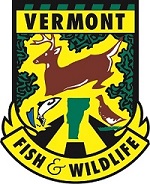
The Vermont Fish and Wildlife Board voted on April 22 to have 55 moose hunting permits awarded this year. Moose permit applications are now available on the Vermont Fish and Wildlife Department’s website www.vtfishandwildlife.com for the hunt limited to Vermont’s Wildlife Management Unit (WMU) E in the northeastern corner of the state.
“Moose density in WMU E is more than one moose per square mile, significantly higher than any other part of the state,” said Nick Fortin, Vermont Fish and Wildlife’s biologist in charge of the moose project. “Moose densities greater than one per square mile support high numbers of winter ticks which negatively impact moose health and survival.”
The Fish and Wildlife Department partnered with University of Vermont researchers to conduct a study of moose health and survival in WMU E. The results of this study, in which 126 moose (36 cows, 90 calves) were fitted with GPS tracking collars, clearly showed that chronic high winter tick loads have caused the health of moose in that part of the state to be very poor. Survival of adult moose remained relatively good, but birth rates were very low and less than half of the calves survived their first winter.
“Research has shown that lower moose densities, like in the rest of Vermont, support relatively few winter ticks that do not impact moose populations,” said Fortin. “Reducing moose density decreases the number of available hosts which in turn decreases the number of winter ticks on the landscape. The goal is to improve the health of moose in WMU E by reducing the impact of winter ticks.”
The department will issue 55 either-sex moose hunting permits in WMU E for the moose seasons this October, which is expected to result in the harvest of approximately 33 moose.
“This is a conservative first step to addressing winter tick impacts on moose in WMU E,” added Fortin. “Given the poor health of the moose population in that area and a clearly identified cause, we need to take action to address this issue. Without intervention to reduce the moose population, high tick loads will continue to impact the health of moose in that region for many years.”
Lottery applications for hunting permits are $10 for residents and $25 for nonresidents. The deadline to apply is July 8. Winners of the permit lottery will purchase resident hunting permits for $100 and nonresident hunting permits for $350. Nonresident applicants are cautioned that although the current “Stay Home Stay Safe” directive and other travel restrictions, which includes self-quarantine requirements for nonresidents, are currently in place until May 15, this directive could be extended into the fall moose hunting season or expanded upon if required as a result of COVID-19. Nonresident applicants are encouraged to consider this before applying as permits issued in 2020 will not be held to the following 2021 hunting season.
Hunters who held a permit within the past five years are not eligible to apply for a permit or to buy a bonus point. Also, although a “bonus point freeze” was in place for the 2018 and 2019 moose seasons, due to limited or no moose permits being available for those years, that is no longer in place and applicants must continue to annually submit a moose permit application if they wish to retain their past bonus permits and accumulate subsequent bonus points.
By law, five permits will be available to Vermont military veterans and up to three permits will be available for “Special Opportunity” recipients with life-threatening illnesses, and three permits will be auctioned in accordance with regulations.
For Immediate Release: April 23, 2020
Media Contacts: Nick Fortin 802-786-3860; Mark Scott 802-777-4217; Adam Miller 802-777-2852
